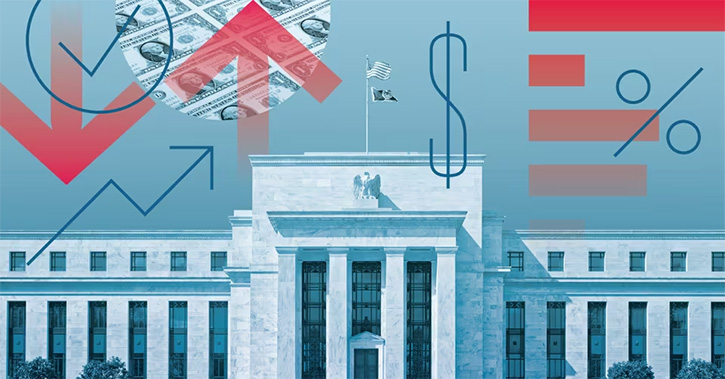This article is part of Morningstar's special report on What the Experts Say
The Federal Reserve is “behind the curve” and interest rates are likely to continue to rise with the US economy looking fine and a recession still three years away, according to M&G Investments’ Richard Woolnough.
As 2018 ended and 2019 begun, central banks across the world, but particularly the US Federal Reserve, changed their tone and became much more dovish. The Fed’s messaging went from calling for gradual rate increases to adjustments, suggesting their next move could, in fact, be a cut.
With the US Treasury yield curve then inverting in early April – generally a pre-cursor to a recession – the market started worrying about the possibility of the US economy rolling over soon.
Investors are now worried about when the next recession will hit. Indeed, it’s a question Woolnough, manager of the Morningstar Silver-rated M&G Corporate Bond and M&G Strategic Corporate Bond funds, constantly asks himself.
That’s because when a recession happens, interest rates generally get cut, hence, his bond funds should have lots of “duration”, or longer-dated bonds. It also gives him an indication of credit risk, as companies, even good ones, tend to default when its economy is weak. When it’s hot, most companies, even bad ones, tend to survive.
But on this front, Woolnough believes it’s good news. The Conference Board US leading Index, which measures 10 key components of the US economy, is still in positive territory, for instance. At the moment, it is suggesting the next recession is roughly three years away, says Woolnough.
Further, the US jobs market is still extremely tight, with initial jobless claims the lowest for 50 years.
Yet at the start of this year everybody was saying there’s going to be a recession in 2020 – 80% of portfolio managers thought there was a recession around the corner. If there’s a recession around the corner then you want to have lots of duration and no credit risk.
If you don’t think there’s a recession around the corner, you want to have lots of credit risk and no duration. For my funds, that’s the view – I don’t think a recession’s around the corner. So, when the world in November/December last year thought a recession was happening, I look as thought I don’t know what I’m doing; suddenly the world decides there isn’t a recession and it looks like I do know what I’m doing because I have a good three months.
Initial jobless claims – people deciding they want to move on from their jobs as a percentage of the total population – is the lowest it’s been for 40 years. This is a tight labour market. You don’t get recessions when you have tight labour markets.
Wages between 3-4%. It’s hard to see deflation in a world where that’s happening.
The market thinks the US is about to stop; I don’t. I think the US economy is fine, I think the Fed’s behind the curve – I think interest rates will continue going up; they won’t be going down.

The View from Karen Ward, JPMorgan’s chief market strategist, EMEA
The biggest news that we’ve had has been the Federal Reserve. In September they were telling us that they needed to be restrictive – the US was growing so strongly, wage growth was picking up and they needed to start touching the brake.
Come February, the language had changed entirely and the buzzword was no longer restrictive, it was patience. They’re in fact telling us they’re not going to raise interest rates any further this year. At the moment, they see no need for further tightening of policy. Not only are they not planning on raising interest rates, they are actually not planning on reducing their balance sheet any further.
So, they’re telling us that real interest rates are going to stay barely positive and the balance sheet, which they had been reducing last year through quantitative tightening they’re near the end of that process and they’re actually going to start expanding the balance sheet again, particularly shifting towards Treasuries.
That’s what the market loves because we’re all QE junkies. We love this extra liquidity, we love what it does to the system and that is what has led markets to reward this year.
What’s caused the central banks to have this major re-think? The honest answer to this is none of us know. It might be some of the data – we had this government shutdown in the US and generally the manufacturing side of the economy looked a little bit soft coming into the start of the year. We also had that big risk-off and the equity markets tanked and maybe they just got frightened and reacted to that.
The problem with that is it’s data and they could change again. If they just said “well the equity markets were falling 20% and we wanted to put a floor under that”, well equity markets have recovered.
Does that mean they could re-assert a more hawkish tone? Possibly, but there’s something else they’ve dangled in front of us. They’ve suggested that maybe they’re aiming for more inflation. That because they’ve had such a long period of inflation below their target, maybe they should strategically try and run a few years with inflation above target.
Of course for markets, that’s really exciting. A central bank telling us they’re going to let inflation pick up. If the Fed do come out and tell us they’re aiming for a bit more inflation, they want the US to run hot, the market is going to really like it.
So, just be aware of these uncertainties around the Fed at the moment.






























